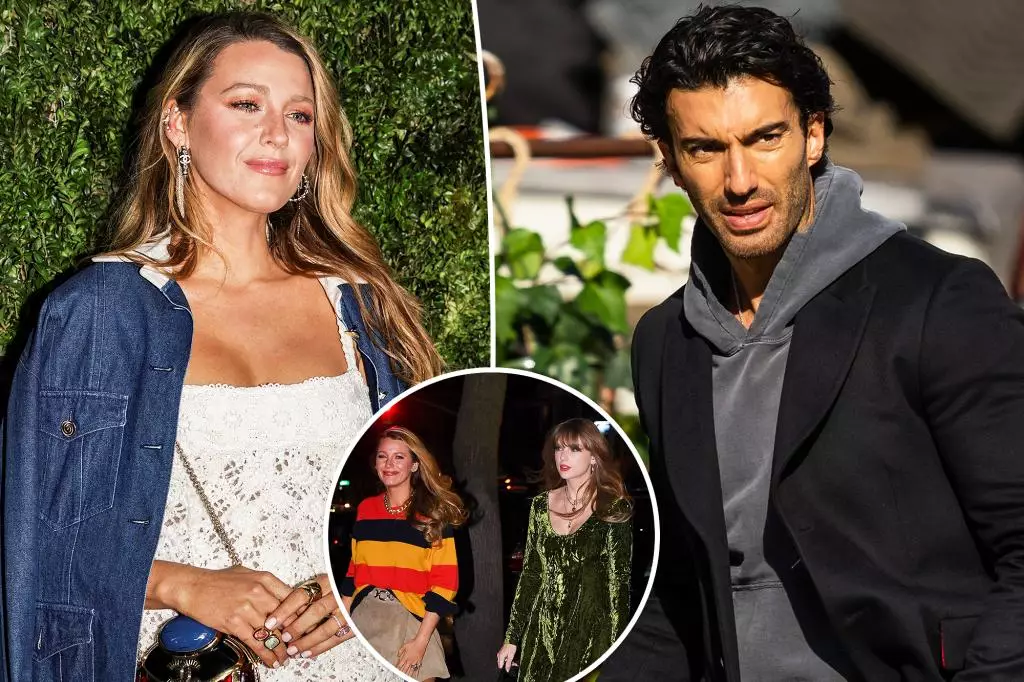In the often bizarre world of celebrity legal battles, the recent clash between Blake Lively and Justin Baldoni has drawn considerable media attention. This feud, filled with complicated legal jargon and a hint of personal vendeta, showcases how easily the lines between friendship, fame, and liability can blur. Lively, the star known for her roles in “Gossip Girl” and “A Simple Favor,” finds herself on the defense as Baldoni, the ambitious director of “Jane the Virgin,” attempts to wield unconventional tactics in what seems to be a misguided attempt to save face amid a spiraling lawsuit.
The heart of the issue arose when Baldoni filed a staggering $400 million countersuit against Lively and her husband, Ryan Reynolds, alleging that the actress was using her friendship with Taylor Swift to manipulate their professional relationship. This claim, bordering on the absurd, indicates the depths to which celebrity clashes can reach. While Hollywood is rife with drama, the tactics employed by Baldoni—especially his attempt to subpoena Swift—suggest a level of desperation, revealing a much larger critique of how personal relationships within the entertainment industry can be weaponized in legal contexts.
Lively’s Protective Order: A Strategic Defense
In her recent motion for a protective order, Lively designed a strategic blockade against Baldoni’s excessive curiosity regarding her text messages with Swift. This legal maneuver is not just about protecting private communications; it symbolizes a broader commentary on the exploitation of relationships in high-stakes environments. By asserting that her communications with Swift are “irrelevant” to the central issues at hand, Lively is not merely trying to shield herself from intrusive inquiries, she is also sending a bold claim that private conversations should remain just that—private.
Lively’s legal team, in addressing the New York judge, articulated that Baldoni’s insistence on probing into their friendship is emblematic of a broader media strategy designed to capitalize on Swift’s fame. The notion that Baldoni can wield Swift’s iconic status as a legal tactic raises ethical questions about the responsibilities and boundaries of public figures in legal disputes. Are they allowed to exploit connections for personal gain? Lively’s motion is a necessary stand against this notion.
The Role of Media Strategy in Legal Battles
The intersection of media and legal pursuits is becoming increasingly complex, particularly in the age of social media where reputations can be rapidly constructed or demolished. Lively’s assertion that Baldoni’s team has actively used Swift’s name in their media strategy points to an unsettling trend: the tendency to leverage public persona for personal litigation advantage. Such tactics could not only distract from the pertinent legal questions but also jeopardize the personal lives of those involved—including innocent parties like Swift, who should not have to bear the brunt of someone else’s dispute.
Lively’s statement implies that Baldoni’s approach is not only undefined by legal rationale but suggests a deeper failure to respect boundaries that celebrities ought to have. The urgency and nature of the inquiry into Swift’s private texts also raises concerns about the psychological toll such litigation may have on all involved parties. By entangling herself in this fight, Lively is reminding the public of the importance of respecting personal privacy—even within the tumultuous framework of Hollywood’s public image.
Outcomes and Implications in Celebrity Legal Entanglements
As this saga unfolds and the court dates loom closer, the implications of this battle extend far beyond the immediate parties involved. The dismissal of Baldoni’s counterclaims and the clear judgment from the New York judge serve as powerful reminders that courtroom strategies built on media manipulation and public persona can lead to dire consequences. It’s also a testament to Lively’s growing influence, standing up not just for herself but also, by extension, for others who might find themselves unjustly embroiled in external conflicts.
As celebrity trials become spectacles, Lively’s motion acts as a beacon for the importance of retaining dignity and integrity in a world that often thrives on scandal. In this case, the juxtaposition of personal relationships against the backdrop of public conflicts illustrates the clash between individuality and the collective scrutiny of fame. The upcoming trial, set for March 2026, leaves ample opportunity for further exploration of these themes, and whether Lively’s resolve can withstand the onslaught of public and legal pressure remains to be seen.
While the legalities inch forward, Blake Lively’s protective order will not only serve to safeguard her privacy but may also inspire others in similar positions to assert their rights amidst the chaos of high-profile litigation.

Leave a Reply